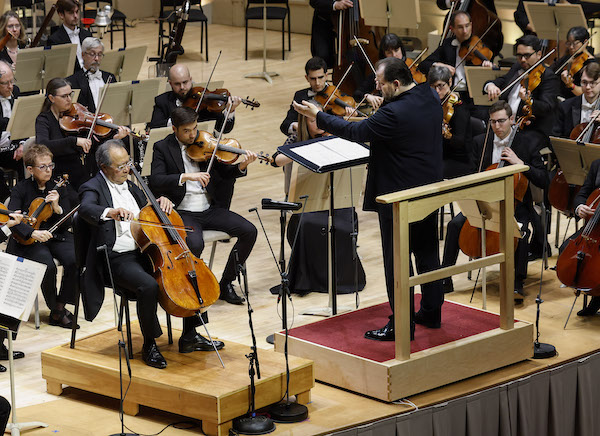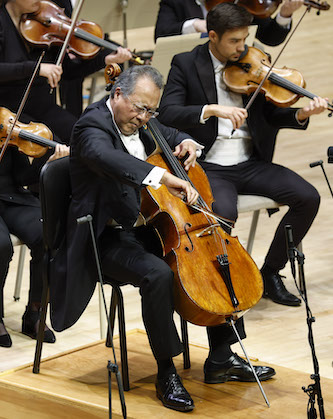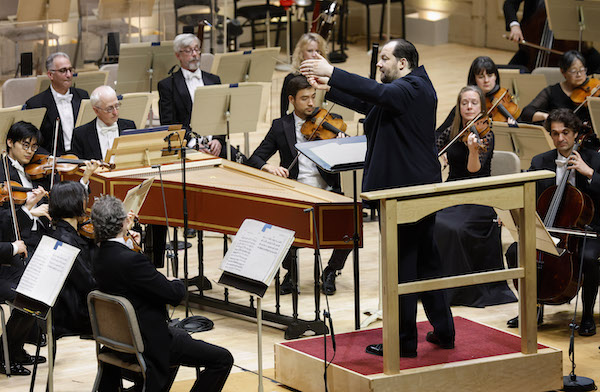Concert Review: Boston Symphony Orchestra — Yo-Yo Ma plays Shostakovich
By Aaron Keebaugh
A concert whose music served as a prayerful elegy for a world spinning out of control.

Andris Nelsons conducting cellist Yo-Yo Ma and the Boston Symphony Orchestra at Symphony Hall. Photo: Winslow Townson
There’s a passage in Dmitri Shostakovich’s Cello Concerto No. 2 where the soloist scratches out a street song that originated in Odessa. Over the course of two movements, the line titters, guffaws, and eventually swells into a plaintive cry.
For Yo-Yo Ma, this leitmotiv, though shrouded in darkness, hints at the universalist idealism of the 1960s — speaking simultaneously to the communist stranglehold of Shostakovich’s native Soviet Union as well as to the wider global calamities surrounding the assassinations of John F. Kennedy and Martin Luther King Jr.
But, as Ma relayed at Symphony Hall on Friday afternoon, this score also resonates in the face of fresh contemporay horrors. In the celebrated cellist’s hands, the Second Cello Concerto, part of the focus of the Boston Symphony Orchestra concerts this past weekend, became in real time a symbol of struggle and solemn commemoration of the ongoing war in Ukraine and recent atrocities in Israel.
Ma and conductor Andris Nelsons were soulful equals throughout this performance, each engaging in a somber musical conversation between ever heightening tension and searching pathos. Ma played with requisite fire in the opening statements and supplied palpable yearning whenever the music slipped away from the light. The street song of the Scherzo flickered faintly before becoming caught up in the gathering orchestral turbulence. Even at its most fervent the melody was both humorous and sarcastic, as if it were a way to shrug off a painful memory.

Cellist Yo-Yo Ma performing with the Boston Symphony Orchestra at Symphony Hall. Photo: Winslow Townson
When Nelsons drew out the sweeping intensity of the final movement, Ma’s was a stalwart voice: grand and stately amidst the waves of orchestral forces. His line rose with assurance against the winds and strings, cresting only momentarily in soft cadences. 40 seconds of silence followed the concerto’s final notes — a poignant act of remembrance for global catastrophes that are still fully aflame.
Ma’s performance of Shostakovich’s First Cello Concerto generated more vigor than reflection. He played the opening motive with a raspy defiance that established forceful momentum. The orchestra thumped out the accompanying oompah rhythms with almost comedic élan.
The crux of this score is the cadenza, which found Ma comfortably unleashing its technical flourishes. Left-hand pizzicatos stung at his wandering line. And his melodies converged — Bach-like — in the double stops that dazzled as much as they conveyed momentary solemnity.
Here too Nelsons painted a dark canvas that mirrored the delicate shapes of Ma’s phrases. Everything culminated in a wild abandon that brought the audience to its feet.
Ma’s encore also generated awe and reverence. Seated along with the cellos stage left, Ma and the section performed Gautier Capuçon’s arrangement of the Prelude from Shostakovich’s Five Pieces for two violins and piano. The music was warm, resonant, and — given Friday’s atmosphere — haunting.
The local premiere of a new work by Iman Habibi resonated with just as much sympathy for a different contemporary struggle.
Zhiân, the title of Habibi’s 13-minute score, finds the composer wrestling with the tensions faced by his fellow Iranians. The title refers to Mahsa Zhina Amini, an Iranian woman left to die suspiciously in the hospital after refusing to wear a hijab as required by repressive government law. During protests over recent months, her name became a symbol of strength and formidable defiance.
And Habibi’s music inspires as well. Zhiân captures everything between rage and prayerful hope, played out through stinging dissonances and warm concluding harmonies. Nelsons’s compelling reading drew seismic urgency from every page of the score.

Andris Nelsons conducts Haydn’s Symphony N0. 22 in E-Flat, “The Philosopher.” Photo: Winslow Townson
He did the same for the opener, Haydn’s Symphony No. 22 in E-flat, “The Philosopher.” Perhaps the plush tone of the strings and winds did not explore all of the sweeping emotions the composer expressed through older Baroque forms. But Nelsons still channeled plenty of zest and lyricism. Here, as well, the music served as a prayerful elegy for a world spinning out of control.
Aaron Keebaugh has been a classical music critic in Boston since 2012. His work has been featured in the Musical Times, Corymbus, Boston Classical Review, Early Music America, and BBC Radio 3. A musicologist, he teaches at North Shore Community College in both Danvers and Lynn.
Tagged: Andris Nelsons, Boston Symphony Orchestra, Iman Habibi

Fantastic review Keebaugh! Glad to see you’re still writing!!!
…GREAT REVIEW…I Wish I Could Have Attended. I Missed Ma Perform This Past Summer At Spac And At Tanglewood. Ma Had Covid. Your Article Was So Well Written, That I Feel, I Was In Attendance.